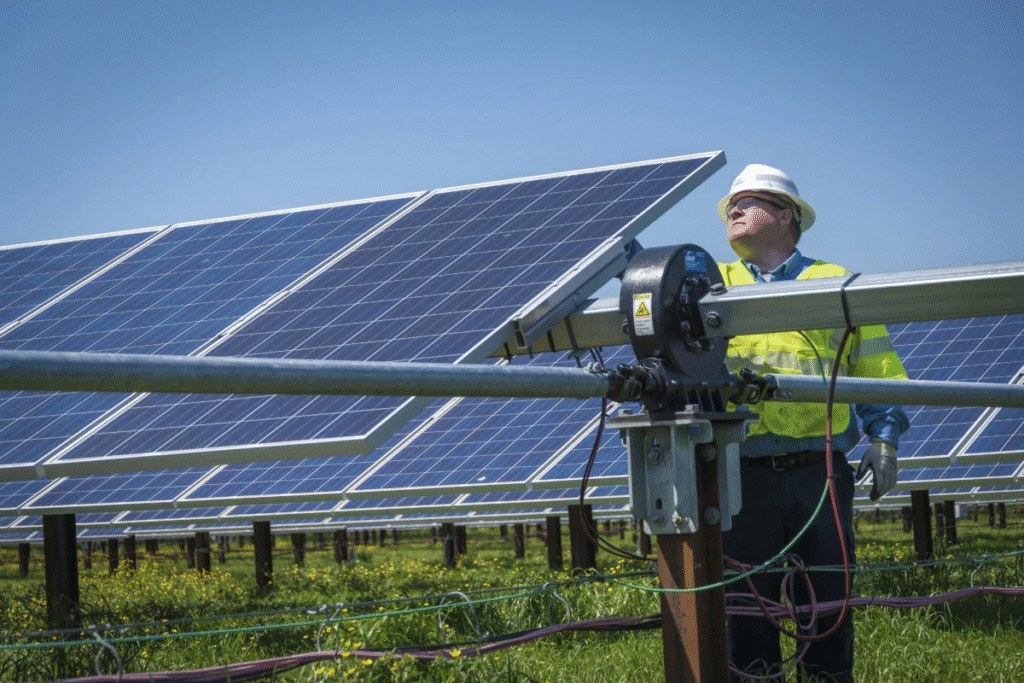Duke Energy Solar Panel Installation | Cost, Rebates & Benefits

Learn everything about Duke Energy solar panel installation in 2025—cost, rebates, incentives, net metering, pros & cons, and how to start saving with solar energy.
Introduction
The shift toward clean and renewable energy has never been stronger. Homeowners across the U.S. are embracing solar power as a cost-effective and sustainable solution for their energy needs. Duke Energy, one of the nation’s largest utility providers, has been at the forefront of this movement—offering solar panel installation programs, rebates, and incentives to encourage adoption.
But how exactly does Duke Energy solar panel installation work? What are the costs, benefits, and potential drawbacks? And most importantly, how can you decide if this is the right investment for your home or business in 2025?
In this guide, we’ll explore everything from the step-by-step installation process to Duke Energy’s net metering policies, rebates, and solar incentives. We’ll also weigh the pros and cons, compare residential vs. commercial solutions, and provide actionable tips for maximizing your solar savings.

Duke Energy Solar Panel Installation
Key Benefits of Going Solar with Duke Energy
- Lower Energy Bills – Solar panels reduce dependency on the grid, helping homeowners cut monthly electricity costs.
- Rebates & Incentives – Duke Energy offers solar rebates and partners with federal/state programs to reduce upfront costs.
- Net Metering Advantage – Homeowners can sell excess energy back to the grid for bill credits.
- Environmental Impact – Solar power is clean, renewable, and reduces carbon footprint.
- Increased Home Value – Properties with solar installations are proven to sell faster and at higher prices.
Going solar is no longer just an eco-conscious choice—it’s also a smart financial decision. For homeowners and businesses in Duke Energy’s service areas, the company’s solar programs, rebates, and incentives make the transition to clean energy even more attractive. Below, we’ll cover the major benefits of choosing solar with Duke Energy in depth.
1. Substantial Cost Savings on Electricity Bills
- Lower monthly utility bills: Installing solar panels reduces your reliance on Duke Energy’s grid power, cutting down monthly electricity costs.
- Net Metering: With Duke Energy’s net metering program, any extra solar energy your system produces goes back to the grid. You earn credits that offset future electricity usage.
- Long-term savings: A typical Duke Energy customer with solar can save thousands of dollars over 20–25 years.
Example: If your home solar system generates more than you consume during the day, those extra kilowatt-hours get credited, reducing your bill at night.
2. Access to Rebates and Incentives
- Federal Solar Investment Tax Credit (ITC): You can claim up to 30% of your solar installation cost on your federal taxes.
- Duke Energy Solar Rebates: Available in select regions, these rebates reduce upfront installation costs significantly.
- State-specific incentives: Depending on your location (NC, SC, FL, etc.), you may qualify for additional tax credits or local grants.
Together, these incentives can cut solar installation costs by 30–50%.
3. Increase in Property Value
- Homes with solar systems sell faster and at a higher price compared to non-solar homes.
- Buyers value lower utility bills and eco-friendly living.
- According to studies, solar homes in Duke Energy service areas can see a 4–6% property value increase.
4. Energy Independence & Protection Against Rising Rates
- Duke Energy customers have seen electricity rates increase over time. By going solar, you protect yourself from future hikes.
- Adding solar battery storage provides backup power during outages and makes you less dependent on the grid.
- Solar panels generate predictable, fixed-cost electricity for decades.
5. Environmental Benefits & Duke Energy’s Renewable Commitment
- Duke Energy is transitioning toward clean energy, and solar customers play a huge role.
- A typical residential solar system offsets 3–4 tons of carbon emissions annually—equal to planting over 100 trees per year.
- Solar energy helps reduce reliance on fossil fuels, making communities greener and healthier.
6. Flexible Residential & Commercial Solar Programs
Duke Energy offers tailored solar programs for:
- Homeowners → Residential solar plans with rebates and net metering.
- Businesses → Commercial solar solutions to cut operating costs and meet sustainability goals.
- Community solar subscribers → For those who can’t install panels, community solar lets you share benefits without rooftop installation.
7. Backup Power with Solar + Storage
- Pairing Duke Energy solar with battery storage systems (like Tesla Powerwall or Duke-approved batteries) ensures uninterrupted power during outages.
- This is especially beneficial in areas prone to storms and hurricanes.
- Batteries also allow you to store cheap daytime energy and use it when grid prices are higher.
8. Easy Process & Strong Support from Duke Energy
- Consultation & guidance: Duke Energy helps evaluate your solar potential and recommends certified installers.
- Smooth integration: The company ensures proper grid connection and metering.
- Ongoing support: Customers benefit from 24/7 monitoring and Duke Energy’s strong service infrastructure.
Quick Comparison: Going Solar with vs. Without Duke Energy
| Feature | With Duke Energy | Without Duke Energy |
|---|---|---|
| Rebates & Incentives | ✅ Available | ❌ Limited |
| Net Metering | ✅ Yes | ❌ Not guaranteed |
| Battery Storage Integration | ✅ Supported | ❌ Not always |
| Utility Bill Credits | ✅ Yes | ❌ No |
| Utility Support & Monitoring | ✅ Provided | ❌ Depends on installe |
Step-by-Step Process of Duke Energy Solar Panel Installation

Duke Energy Solar Panel Installation Process
1. Initial Assessment & Consultation
- Homeowner requests a free consultation through Duke Energy or a certified solar partner.
- Energy usage, roof condition, and sunlight exposure are evaluated.
2. Custom Solar System Design
- Engineers design a tailored system based on your household’s energy needs.
- Duke Energy ensures compatibility with grid interconnection policies.
3. Permits & Approvals
- Necessary permits are filed with local authorities.
- Duke Energy reviews applications for grid connection approval.
4. Professional Installation
- Certified technicians install solar panels, wiring, and inverters.
- Installation typically takes 1–3 days, depending on system size.
5. Inspection & Interconnection
- Local inspectors approve the setup.
- Duke Energy connects your system to the grid and enables net metering.
6. Monitoring & Maintenance
- Duke provides online monitoring tools to track production.
- Routine maintenance is minimal but recommended annually.
Pros and Cons of Duke Energy Solar Panel Installation
| Pros | Cons |
| Substantial cost savings on electricity | High upfront installation costs |
| Access to Duke Energy rebates and federal incentives | Roof suitability may limit eligibility |
| Net metering provides bill credits for excess energy | The installation timeline varies depending on permits |
| Environmentally friendly, reduces carbon footprint | Initial paperwork and approval can be time-consuming |
| Increased property value | Effectiveness depends on local weather & sun exposure |
Duke Energy Solar Panel Installation Costs in 2025
The cost of solar installation depends on system size, location, and roof conditions. On average:
- Residential systems: $12,000 – $18,000 (before incentives)
- Commercial systems: $50,000 – $200,000+ (depending on size)
- Federal Solar Investment Tax Credit (ITC): 30% credit on total costs
- Duke Energy Rebates: $0.60 per watt for residential customers (varies by state program availability)
Example: A 6 kW system costing $15,000 could be reduced to around $9,000 after rebates and federal tax credits.
Residential vs. Commercial Solar Options with Duke Energy
| Feature | Residential Solar | Commercial Solar |
| Average System Size | 5–8 kW | 50–500+ kW |
| Cost Range | $12,000–$18,000 | $50,000–$200,000+ |
| Rebates & Incentives | Yes, residential-focused | Yes, often larger benefits |
| Net Metering Eligibility | Widely available | Available but with different caps |
| ROI Timeline | 6–9 years | 3–7 years |
| Best For | Homeowners reducing bills | Businesses lowering operational costs |
Conclusion
Going solar with Duke Energy solar panel installation in 2025 is more than just an eco-friendly choice—it’s a financially smart decision that can lower bills, provide long-term savings, and contribute to a cleaner environment. With rebates, federal tax credits, and net metering, homeowners and businesses can reduce upfront costs while maximizing returns.
If you’re ready to explore solar, Duke Energy makes the process simple—from consultation to installation and monitoring. The sooner you switch, the faster you’ll see savings and energy independence.
CTA: Contact Duke Energy today to schedule a free consultation and start your solar journey toward lower bills and a sustainable future.
FAQs
How much does a Duke Energy solar panel installation cost?
The process typically takes 1–3 months from consultation to grid interconnection, depending on permits and approvals.
Yes, Duke Energy provides commercial solar solutions, which often yield faster ROI compared to residential installations.
Yes—due to falling installation costs, strong incentives, and rising electricity rates, solar panels with Duke Energy are a smart long-term investment.
